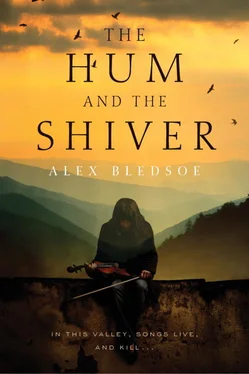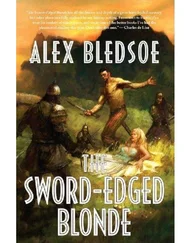“I don’t care if it sows black-eyed peas,” she snapped. “I’ll do this show, but not if I have to ride in that.”
Maitland’s voice grew softer, and he leaned so close, she could smell his aftershave. “Private Hyatt, this is not a ‘show.’ It’s a hero’s welcome. Perhaps you should be a bit more… gracious?”
Bronwyn turned her dark eyes on him. “Major, I’m as gracious as a possum at the Brickyard, but there’s no way I’m going to ride through my hometown like some sort of trailer park beauty queen.”
“I agree,” Maitland said. “The thing is, it would make it much easier for all those people to see you. So it’s really not for you, it’s for them. ”
There was no arguing with that. Left to her own preferences, Bronwyn would’ve returned home in the middle of the night wearing sunglasses and a blond wig. This carnival was for everyone but her.
The platform for her return consisted of an enormous Ford pickup truck jacked up on gigantic tires, towing a small yacht. The masts had been removed, and a sort of throne had been mounted high on the foredeck. The bow sported the now-ubiquitous high school moniker known far and wide since her rescue: THE BRONWYNATOR.
When she saw the name, she muttered, “Oh, God,” and shook her head. “Do I get to keep it when we’re done?” she asked sarcastically.
“Ah… no, I’m afraid not.”
Bronwyn managed a knowing smile. “You’re very good at your job, sir.”
“I’m just grease for the gears of necessity,” he said with absolutely no irony.
* * *
Craig threaded through the crowd lining the street until he reached the incongruously new post office building. Rockhouse Hicks sat in a rocking chair on the porch. Something about the old man stopped strangers from approaching him, and even other locals gave him plenty of space, inside an invisible circle that kept everyone else away. The effect was almost tribal, as if Hicks were a chief or medicine man. Craig’s research on the Tufa, though, insisted they were all fervent individualists with no hierarchy, so he couldn’t be any sort of leader. Unless Hicks’s peculiar birth defect—six working fingers on each hand—fulfilled some unknown community superstition, Craig could only work with the idea that people avoided the old man because, simply, he was a shit-head.
But with the Tufa, you could never be sure. Dark haired and dark skinned, yet not white, black, or Native American (although often content to be mistaken for any of the above if it meant they’d be left alone), the Tufa kept their secrets so close that, to Craig’s knowledge, no one even knew how they’d turned up deep in Appalachia. Yet when the first official Europeans had reached this valley three centuries earlier, the Tufa were already here, living quietly in the hills and minding their own business.
Craig, however, was determined to reach out to everyone, even (or especially) the ones no one else would accept. One of the first things he learned was that no one in Cloud County really liked Rockhouse, and he sympathized with the mean old man’s isolation. So he leaned against the wall beside him and asked, “Ever seen a helicopter over Needsville before, Mr. Hicks?”
Hicks slowly turned. He had sun-narrowed eyes that made his expression impossible to read, but the hint of malevolence shone through. Craig imagined that as a younger man, Hicks had been serious trouble.
“Reverend Checkers,” he said.
“Chess,” Craig corrected with a smile.
Hicks continued to glare at him. Then just as slowly, he returned his gaze to whatever he’d been contemplating before. Craig knew this counted as a dismissal, but he wasn’t giving up that easily. “She’s getting quite a welcome. Can you see okay from here? I bet they’d let you sit up on the podium if you asked.”
“Seen that girl since she was knee-high to a wet fart. Don’t reckon she looks that different now.”
“Now she’s a hero, though.”
Hicks said nothing, but spit out onto the tiny lawn at the base of the post office flagpole.
“You don’t think so?” Craig persisted. “She killed ten enemy soldiers single-handed.”
“They say.”
“You don’t believe it?”
Hicks spit again and shrugged. “Wasn’t there. Don’t trust stories about killings unless I see the corpse myself. Been burned that way.”
The hint of mystery piqued Craig’s interest, and the annoyance in Hicks’s voice felt like as big a triumph as a whole congregation answering the call to salvation at the end of a service. Any reaction Craig got from the old man was a step forward, a break in the isolation. “Well, I’m going to see if I can find a better spot to watch from. Y’all have a good day, Mr. Hicks.”
As he worked his way back along the road, he bumped into the man he’d seen earlier, the Tufa reporter. He said, “Excuse me,” and tried to catch a glimpse of the name on the press pass. It read SWAYBACK.
* * *
The yellow ribbons tied to trees, fence posts, and telephone poles, clichéd as they were, made Bronwyn feel surprisingly warm inside. She recalled tearing ribbons from some of the same trees when she was a kid, convinced they were too hokey to have any meaning. But now that they were displayed for her, she understood them in a new light, even if she still thought they were inane.
Like Cleopatra on her barge, she was towed slowly down into the valley toward Needsville. She sat in the ludicrous chair and gritted her teeth against the vibrations going through her shattered leg bones. Somehow they’d mounted a leather recliner to the foredeck, with a modified footrest to support her injured leg. It seemed solid enough, but did nothing to make her feel less ridiculous. She thought about waving with the back of her hand turned out, like Queen Elizabeth, or mouthing “This is so lame,” as Nancy Kerrigan had at Disneyland. But at least for a little while longer, she was still a soldier; she’d do neither.
She wanted to stare straight ahead, at the fresh lines painted on the highway after the state repaved it earlier in the spring, but there was no resisting the pull of the mountains. At first she looked only with her eyes, cutting them enough to see the lush trees and rolling slopes visible past the MPs standing at the deck rails beside her. But like that first taste of liquor to an abstaining drunk, it only made it worse. The leaves sang to her, tunes blew through the breeze, and for a moment something that had been silent and still since she’d left this place vibrated deep in her chest. But it was only a moment; like everything else, it faded to numbness and left her aware of its presence but unable to actually feel it.
Except somehow, she sensed danger. Not the immediate kind as she’d known in Iraq, but real nonetheless. It was like a shadowy animal glimpsed over the tall grass that ducked out of sight the instant before she turned to look directly at it.
It took twenty minutes to drive the half mile from the city limits to the bandstand and podium set up outside City Hall. The crowd’s response was every bit as loud as the helicopter’s engine. Bronwyn saw few heads of straight black hair or dark sullen eyes among the throng; and, as she expected, Rockhouse Hicks had not moved from the post office porch. It was okay, though; she’d have plenty of time to see the locals. These strangers weren’t here to see her, anyway; they wanted the Bronwynator.
Two MPs carefully carried her to the stage, where Maitland provided the promised crutches. Her injured arm could barely do its job, but it was a matter of pride that she stand before these people. She reached the podium and waited patiently while the applause continued and the cameras fired away.
Читать дальше












